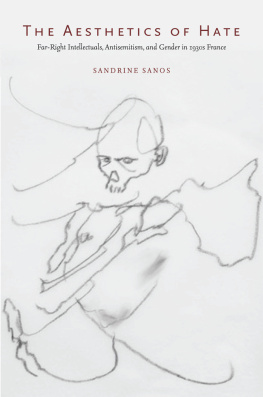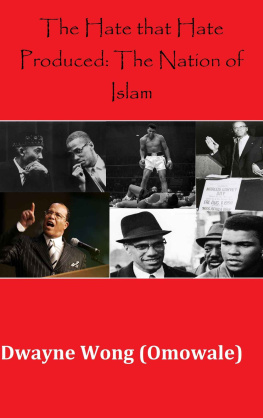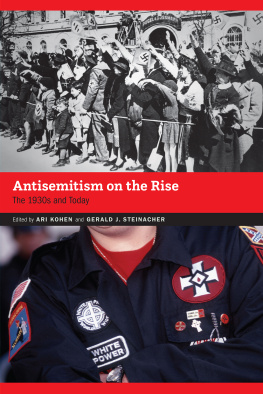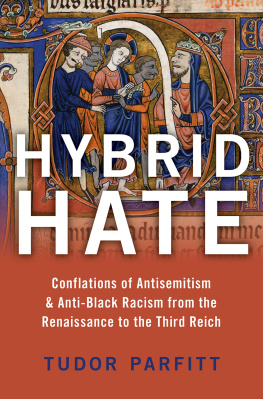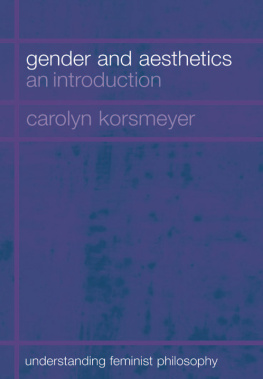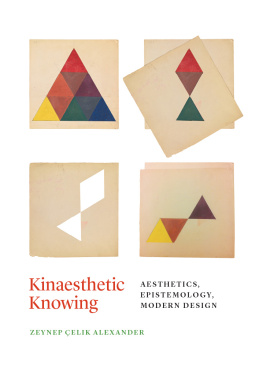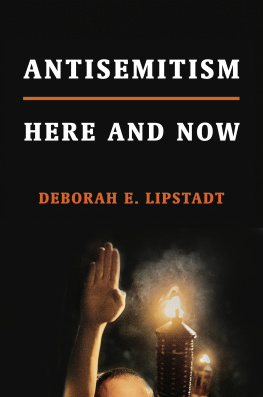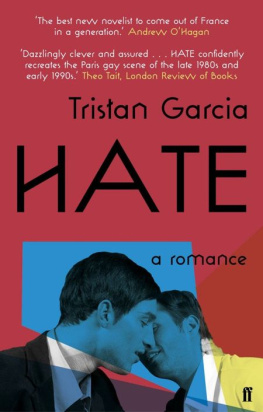THE AESTHETICS OF HATE
Far-Right Intellectuals, Antisemitism, and Gender in 1930s France
SANDRINE SANOS
Stanford University Press Stanford, California
Stanford University Press
Stanford, California
2013 by the Board of Trustees of the Leland Stanford Junior University. All rights reserved.
This book has been published with the assistance of the Claudia ClarkRebecca GershensonMegan McClintock Memorial Fund of the History Department of Rutgers, the State University of New JerseyNew Brunswick, and the Joe B. Frantz History Enhancement Fund at Texas A&M UniversityCorpus Christi.
No part of this book may be reproduced or transmitted in any form or by any means, electronic or mechanical, including photocopying and recording, or in any information storage or retrieval system without the prior written permission of Stanford University Press.
Printed in the United States of America on acid-free, archival-quality paper
Library of Congress Cataloging-in-Publication Data
Sanos, Sandrine, author.
The aesthetics of hate : far-right intellectuals, antisemitism, and gender in 1930s France / Sandrine Sanos.
pages cm
Includes bibliographical references and index.
ISBN 978-0-8047-7457-4 (cloth : alk. paper)
ISBN 978-0-8047-8283-8 (e-book)
1. Right-wing extremistsFranceHistory20th century. 2. RadicalismFranceHistory20th century. 3. AntisemitismFranceHistory20th century. 4. MasculinityFranceHistory20th century. 5. Fascist aestheticsFranceHistory20th century. 6. Politics and literatureFranceHistory20th century. 7. FranceIntellectual life20th century. 8. FrancePolitics and government19141940. I. Title.
HN440.R3S26 2012
303.48'40944dc23
2012014036
Typeset by Bruce Lundquist in 10/14 Minion Pro
mes parents, Louise et Serge Sanos, qui je dois tout et sans qui rien naurait t possible.
C ONTENTS
A CKNOWLEDGMENTS
This book took many years to bring to fruition, and because of this, it bears the tracessome visible, some notof the conversations that have shaped and inflected it. Among other things, it stands as a testament to those whose friendship has sustained me. Whatever remains of failings and weaknesses are, inevitably, of my own doing.
To write, one needs not only a place but time and comfort, and I have been fortunate to receive material support that helped in the making of this book. While at Rutgers University, I benefited from the generous institutional support of its history department, grants from the Vidal Sassoon International Center for the Study of Antisemitism at Hebrew University, residence as a fellow at the Center for the Critical Analysis of Contemporary Culture (Rutgers University), and later a research grant from Earlham College. Finally, a summer stay at the Institute for Advanced Study in Princeton gave me the precious time, resources, and peace needed to complete this work. At the same time, I am indebted to many individuals who, in both small and important ways, have encouraged me and helped with this project. I would like to thank the archivists at the Bibliothque de documentation internationale contemporaine in Nanterre, especially Grgory Cingal. At Earlham College, the late Bob Southards faith in my project and his boundless knowledge of Jewish history, JoAnn Martins incisive comments, and Anupama Aroras astute questions, generous encouragement, and rigorous editorial eye helped me begin revising. I am also grateful for the support afforded me by my colleagues in the history department at Texas A&M UniversityCorpus Christi. I would especially like to warmly thank the anonymous readers whose sharp and thoughtful comments were crucial in shaping the final manuscript into an intelligible and cogent book. I am also thankful to Chloe Piene for allowing me to use her work for the book cover, and to William Schmiechen, who introduced me to it. Last, but not least, I am grateful to Norris Pope for taking an interest in this project and for being a most supportive and insightful editor, as well as to Sarah Newman and Carolyn Brown for expertly shepherding the book through, and to Jan McInroy for her impeccable work.
Like most, I have turned to networks of affinities and friendships that have sustained me and, at every moment, pushed me to become a better thinker, colleague, and friend. This project was still in its infancy when Francine Muel-Dreyfus agreed to work with me at the cole des hautes tudes en sciences sociales, and her conviction that such an analysis must be undertaken mattered. I cherished my time at Rutgers, and I could not have hoped for a more congenial and lively atmosphere than that of its history department. I would like to thank those faculty and students who provided that vibrant intellectual environment, as well as those who over the yearswhether they read portions, parts, chapters, or just discussed this project with me, sometimes on a minute detailproved tirelessly generous: Belinda Davis, Omer Bartov, and Nancy Hewitt, as well as my peers Brady Brower, Amy Forbes, Kate Keller, Max Likin, Marc Matera, and Michal Shapira. I have been fortunate to learn about intellectual history from Donald R. Kelley, whose erudition and wise advice were precious. Outside Rutgers and at different times, Mary-Lou Roberts, Geoff Eley, Jonathan Judaken, Denis Provencher, and especially Judith Surkis provided much-needed encouragement and insights on different aspects of the book. Especially warm thanks are due to Lou Roberts, Dagmar Herzog, and Todd Shepard, whose works have inspired me.
The web of friends who have always provided a home for me is wide. Their warmth and love have made the travails and times spent revising and revisiting this project all the more bearable. Seema Prabhu and Somkid Kingman offered me a refuge in order to begin a substantial part of revisions, and Seema has remained an indispensable presence despite our geographical distance from each other. In New York and New Jersey, Brian Connolly, Sad Gahia, Stuart Gold, Rebecca Hartman, David Hogg, Jennifer Milligan, Gautam Sarin, and Todd Shepard all offered cheer, wine, and endless provocative discussions. In Indiana, Anupama Arora and JoAnn Martin made all the difference, and still do. In South Texas, Laura Muoz and Natasha Crawford, Glenn Tiller and Florence Garcia-Tiller, and David and Janet Blanke welcomed me with their hospitality and friendship. In Paris, London, and Berlin, I owe my wonderful times to Laure Beaufils, Vanessa Benoit, Flora Bernard, Charlotte Bigg, Fabian Chappuis, and Hlne Marineau. Together, all these friends have provided me with the kind of affective and intellectual community without which one cannot thrive or survive. I hope they will forgive my silences, absences, and chronic obsession.
My greatest debt is to those who welcomed and trained me, and offered models of intellectual and professional engagement. This work would not have materialized without the unfailing support and rigorous training of Bonnie G. Smith and Joan W. Scott. I came to the United States to study gender and womens history, and both have guided and inspired me to become a better scholar and thinker. Bonnie Smiths attention to rigor, her boundless energy, and her wit have been invaluable. Her timely and incisive questions always challenged me to avoid the banal and the commonsensical and sharpened my thinking, while encouraging me to think broadly and expansively. She saw how my work mattered before I did. Her enduring support of this project (as I struggled) and her insistence on writing well (as well as many wonderful dinners in New York and Paris) have sustained my work. Joan W. Scott has also been a most generous, attentive, and supportive mentor, always reminding me what it means to do history with passion. She prompted me to question my assumptions, to think differently, and to reflect on the nature of historical writing. Her patience while I tried to think through the various issues at the heart of this project and her faith that I could work it outwhile reading entire draftsstill amaze me. I have cherished our many conversations about most things French and feminist. I am ever grateful to her for offering me the gift of a stay at the Institute for Advanced Study, which allowed me to complete this book.

